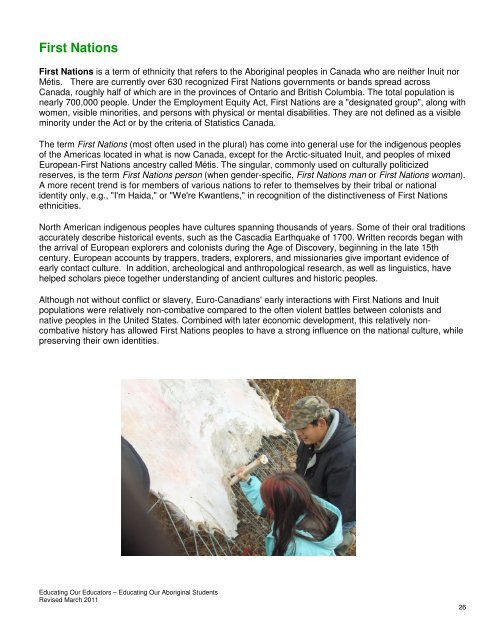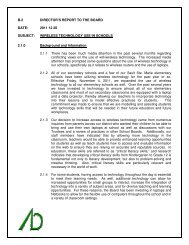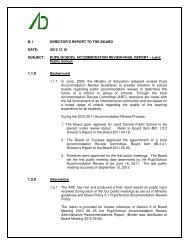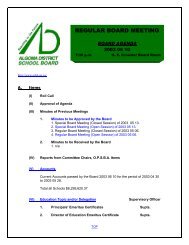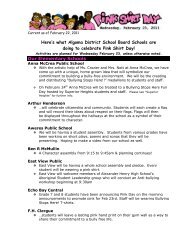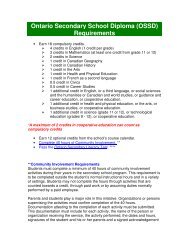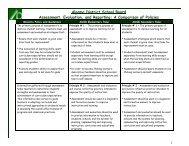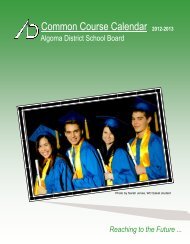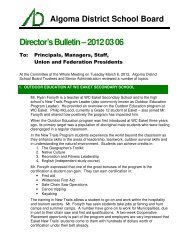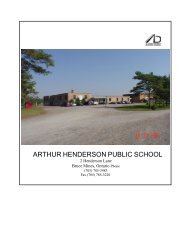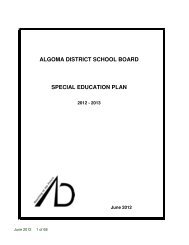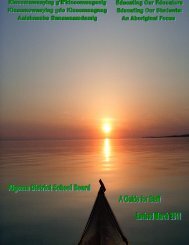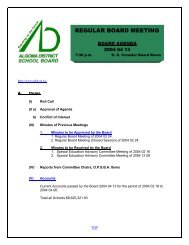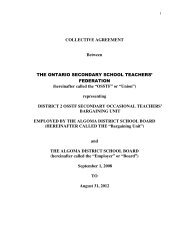First NationsFirst Nations is a term of ethnicity that refers to the Aboriginal peoples in Canada who are neither Inuit norMétis. There are currently over 630 recognized First Nations governments or bands spread acrossCanada, roughly half of which are in the provinces of Ontario and British Columbia. The total population isnearly 700,000 people. Under the Employment Equity Act, First Nations are a "designated group", along withwomen, visible minorities, and persons with physical or mental disabilities. They are not defined as a visibleminority under the Act or by the criteria of Statistics Canada.The term First Nations (most often used in the plural) has come into general use <strong>for</strong> the indigenous peoplesof the Americas located in what is now Canada, except <strong>for</strong> the Arctic-situated Inuit, and peoples of mixedEuropean-First Nations ancestry called Métis. The singular, commonly used on culturally politicizedreserves, is the term First Nations person (when gender-specific, First Nations man or First Nations woman).A more recent trend is <strong>for</strong> members of various nations to refer to themselves by their tribal or nationalidentity only, e.g., "I'm Haida," or "We're Kwantlens," in recognition of the distinctiveness of First Nationsethnicities.North American indigenous peoples have cultures spanning thousands of years. Some of their oral traditionsaccurately describe historical events, such as the Cascadia Earthquake of 1700. Written records began withthe arrival of European explorers and colonists during the Age of Discovery, beginning in the late 15thcentury. European accounts by trappers, traders, explorers, and missionaries give important evidence ofearly contact culture. In addition, archeological and anthropological research, as well as linguistics, havehelped scholars piece together understanding of ancient cultures and historic peoples.Although not without conflict or slavery, Euro-Canadians' early interactions with First Nations and Inuitpopulations were relatively non-combative compared to the often violent battles between colonists andnative peoples in the United States. Combined with later economic development, this relatively noncombativehistory has allowed First Nations peoples to have a strong influence on the national culture, whilepreserving their own identities.<strong>Educating</strong> <strong>Our</strong> <strong>Educators</strong> – <strong>Educating</strong> <strong>Our</strong> Aboriginal StudentsRevised March 201126
The MétisThe Métis are a separate and distinct people with ancestry from traditional Métis catchment areas (not reserves)and have Métis rights that are not derivative of Aboriginal rights. Métis people are as different from First Nationspeople as the Inuit are.Prior to Canada’s crystallization as a nation, the Métis people emerged out of the relations of Indian women andEuropean men in west central North America. While the initial offspring of these unions were individuals whopossessed mixed ancestry, the gradual establishment of distinct Métis communities, outside of Indian and Europeancultures and settlements, as well as the subsequent intermarriages between Métis women and Métis men, resultedin the genesis of new Aboriginal peoples – the Métis.The Métis people constitute a distinct Aboriginal nation largely based in western Canada. The Métis Nation grounds itsassertion of Aboriginal nationhood on well-recognized international principles. It has a shared history, common culture(song, dance, national symbols, etc.), unique language (Michif with various regional dialects), and extensive kinshipconnections from Ontario westward, distinct way of life, traditional territory and collective consciousness.In March 1983, the Métis Nation separated from the Native Council of Canada to <strong>for</strong>m the Métis National Council – itsown Métis-specific representative body. The Métis National Council represents the Métis nation nationally andinternationally. It receives its mandate and direction from the democratically elected leadership of the Métis Nation’sgovernments from Ontario Westward (Métis Nation of Ontario, Manitoba Métis Federation, Métis Nation –Saskatchewan, Métis Nation of Alberta, Métis Nation – British Columbia).Within Ontario, historic Métis communities arose along various watersheds throughout the province and have distincthistories and characteristics. In contemporary times, the Métis Nation has identified that there are approximately 12historic Métis communities (catchment areas) that continue to exist. Sometimes they are within larger non-aboriginalcommunities. Métis people live throughout Ontario in urban, rural or remote areas, including Thunder Bay.The rights of the Métis people have been a topic <strong>for</strong> debate since the events of Red River and Batoche. The MétisNation, as a young Aboriginal nation indigenous to North America, possessed the rights held by all other Aboriginalnations. In practice however, the 1870 government of Canada dealt with the Métis Nation differently. Following thetransfer of Rupert’s Land to Canada, the federal government dispatched Commissioners to the West to settle legalownership of the land with the Aboriginal inhabitants. The Commissioners collected signatures on two kinds ofdocuments: Collective treaties <strong>for</strong> Indian bands, and Scrips <strong>for</strong> Métis individuals.In the 1930’s, The Métis Nation reawakened with 1.25 million acres in northern Alberta. In the 1960’s and 1970’s,the Métis movement took shape, in part empowered with many elements of course: the Canadian Bill of Rights(1960), the Civil Rights movement, and the AIM movements all played a part in the growing consciousness of the Métis,non-status Indians. This movement peaked during the Constitutional talks of 1981 and 1982.<strong>Educating</strong> <strong>Our</strong> <strong>Educators</strong> – <strong>Educating</strong> <strong>Our</strong> Aboriginal StudentsRevised March 201127


